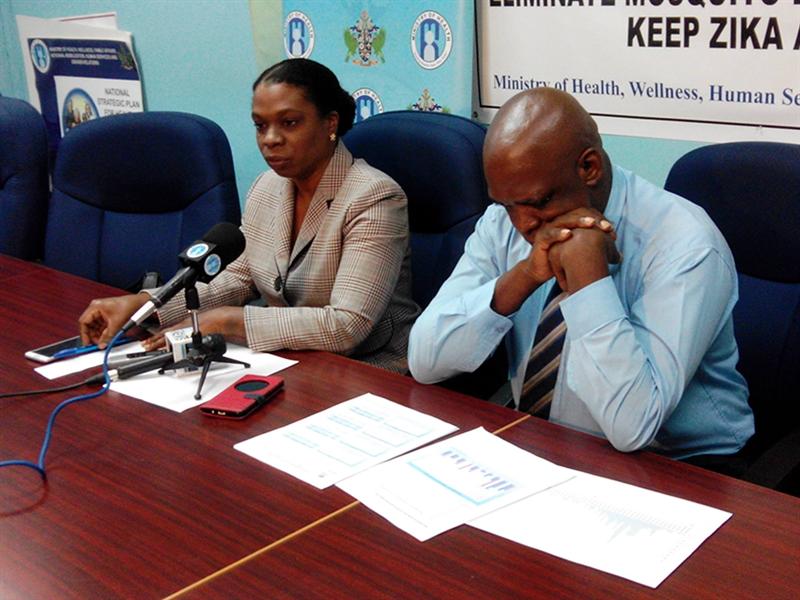Medical officials zero in on Saint Lucia's pregnant women in the fight against the Zika virus.
 As the Zika Virus Disease outbreak unfolds, the Ministry of Health and Wellness continues heightened surveillance of pregnant women confirmed with Zika Virus Disease. Presently, we are monitoring 26 pregnant women who have tested positive for the Zika Virus Disease. Many of these cases presented early in pregnancy with the main symptom being a rash. About half of the women had a recent history of fever, and relatively few presented with red eye or joint pains. All of the pregnant women confirmed so far have recovered from the Zika Virus illness. However given the concerns regarding pregnancy outcomes in Zika positive pregnant women, these women are being monitored closely through antenatal care services.
As the Zika Virus Disease outbreak unfolds, the Ministry of Health and Wellness continues heightened surveillance of pregnant women confirmed with Zika Virus Disease. Presently, we are monitoring 26 pregnant women who have tested positive for the Zika Virus Disease. Many of these cases presented early in pregnancy with the main symptom being a rash. About half of the women had a recent history of fever, and relatively few presented with red eye or joint pains. All of the pregnant women confirmed so far have recovered from the Zika Virus illness. However given the concerns regarding pregnancy outcomes in Zika positive pregnant women, these women are being monitored closely through antenatal care services.
Zika Virus Disease is transmitted mainly by mosquitoes but recent information from global public health authorities has confirmed that the disease can also be transmitted sexually. Zika virus infection can also be passed from mother to child during pregnancy. Though generally mild, the disease has been shown to cause serious complications (such as microcephaly) in some newborns of infected mothers and Guillain Barre Syndrome in a few persons who have recently been infected with the Zika Virus.
In the context of the present Zika outbreak, women of child bearing age are encouraged to utilize contraceptives in order to prevent 'unintended' pregnancies. Contraceptives are available at all Wellness Centers within communities’ island-wide, as well as at the Saint Lucia Planned Parenthood Association and health related facilities within the private sector. Women who plan to become pregnant at this time are encouraged to take all measures to prevent themselves from being bitten by mosquitoes, and thereby, decrease their risk of becoming infected with the Zika Virus.
The Ministry of Health is also presently monitoring a patient diagnosed with Guillain Barre Syndrome, who is suspected as having recently had Zika Virus Disease. Zika Virus Disease has not yet been confirmed in this patient. The patient, an adult male, presented with weakness in his legs and difficulty walking, after suffering from Zika like symptoms. He has been treated according to standard protocol and has received immune therapy to halt the progression of the paralysis.
The Ministry of Health and Wellness in conjunction with partners in health, tourism, public and private sectors and civil society groups have implemented and continue to engage in a number of initiatives to decrease the impact of Zika Virus Disease on the population. These measures include but are not limited to: increased surveillance for Zika Virus and its complications, health education and promotion to the public, health care worker training both local and regional, strengthening of primary and secondary health care system to manage the increase in cases and prepare for possible complications, extensive island-wide clean-up campaigns with support from community groups, extensive inter ministry stakeholder consultations, antenatal clinical strengthening, environmental health strengthening to include “fogging”, increased awareness by collaboration with Ministry of Education for the school poster competition, participation in regional initiatives such “Vector Awareness Week” with the OECS and “Mosquito Awareness Week” with CARPHA and PAHO and continuous consultations with regional public health partners.
The Zika Virus Disease is spread predominantly by mosquitoes, particularly those which breed in and around households. Therefore, individuals and members of their households are important in the ongoing national effort to reduce the transmission of Zika. This can be achieved by householders conducting weekly inspections of their premises, both inside and outside, to identify and remove any items which can hold water thereby increasing the possibility of mosquito breeding. The Ministry of Health also reminds the public that personal protection to avoid mosquito bites is an effective prevention strategy to reduce the spread of the disease. By wearing long, light colored clothing and using mosquito repellents as recommended by the manufacturers and use of mosquito screens and nets, the chances of being exposed to the Zika virus can be minimized.
For more information please contact the office of the Chief Medical Officer at telephone numbers 468-5309.